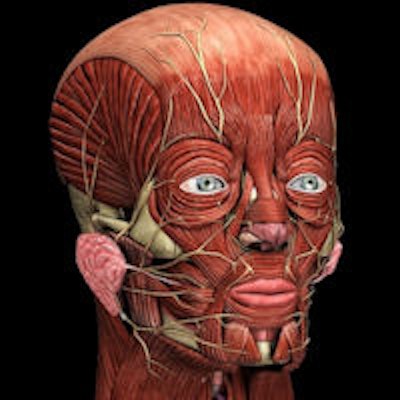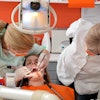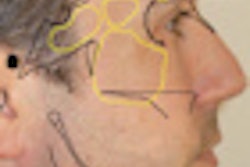
A new 3D visualization system developed in Scotland has the potential to revolutionize dental and medical training.
The 3D Digital Head and Neck, developed at the Glasgow School of Art and unveiled April 24, is designed to enable students and clinical trainees to view, manipulate, and interact with a 3D head in real-time in order to develop an understanding of anatomy and learn diagnostic techniques and procedures.
The 3D model includes accurate visualizations of the skeleton, nervous system, blood supply, muscles, supporting tissues, and lymphatic drainage. Also integral to the project was the development of an interactive dental injection simulator that will allow students to physically feel what it is like to give a local anesthetic injection and check that the injection was successfully and safely administered.
 The 3D Digital Head and Neck tool is designed to enable students and clinical trainees to view, manipulate, and interact with a 3D head in real-time. All images courtesy of Glasgow School of Art.
The 3D Digital Head and Neck tool is designed to enable students and clinical trainees to view, manipulate, and interact with a 3D head in real-time. All images courtesy of Glasgow School of Art.Following an international tender that saw submissions from across Europe, the research team at the Glasgow School of Art's Digital Design Studio was commissioned to develop the 3D Digital Head and Neck. The Digital Design Studio previously produced 3D digital models of selected anatomy to support activities such as preoperative planning, risk reduction, surgical simulation, and increased patient safety. For the project, the studio collaborated with academics at the University of Glasgow Dental School and Department of Anatomy and with surgeons and teaching staff at the Centre for Health Science at Raigmore Hospital in Inverness.
Construction of the model required careful dissection of a cadaver, with laser scanning at each stage, to ensure that all anatomical details were captured in three dimensions. The designers then used their expertise to reconstruct the head and neck, and develop software that could manipulate the model.
"The 3D Digital Head and Neck has been one of the most important multidisciplinary research projects undertaken by the Digital Design Studio to date," said Paul Anderson, director of the studio, in a university news release. "It has been a privilege to work with NES [>National Health Service Education for Scotland, the national education and training board] and with academic colleagues and medical practitioners across Scotland to create this clinical resource, which will revolutionize the training of healthcare professionals and improve patient safety."
The 3D Digital Head and Neck is the largest scale project commissioned to date by NES as part of an ongoing program of initiatives to enhance the understanding of anatomy, improve patient safety, and increase the flexibility of training for all healthcare professionals.
To enable dental teams and undergraduates to take full advantage of these new educational resources, NES has also invested in 3D teaching laboratories in Glasgow, Dundee, Inverness, and Stornoway. Similar laboratories are being developed in Dumfries and Aberdeen to ensure that the 3D packages are available to an even wider range of students, Anderson noted.
These laboratories allow students to experience a level of 3D that until now has only been available to professional broadcasters and media, and, as all the centers are linked, it is possible for a tutor in one center to lead a lesson with students at multiple centers at the same time. This capability is already being used by hygiene/therapy students at the University of the Highlands and Islands based in Dumfries, Inverness, and Stornoway.



















